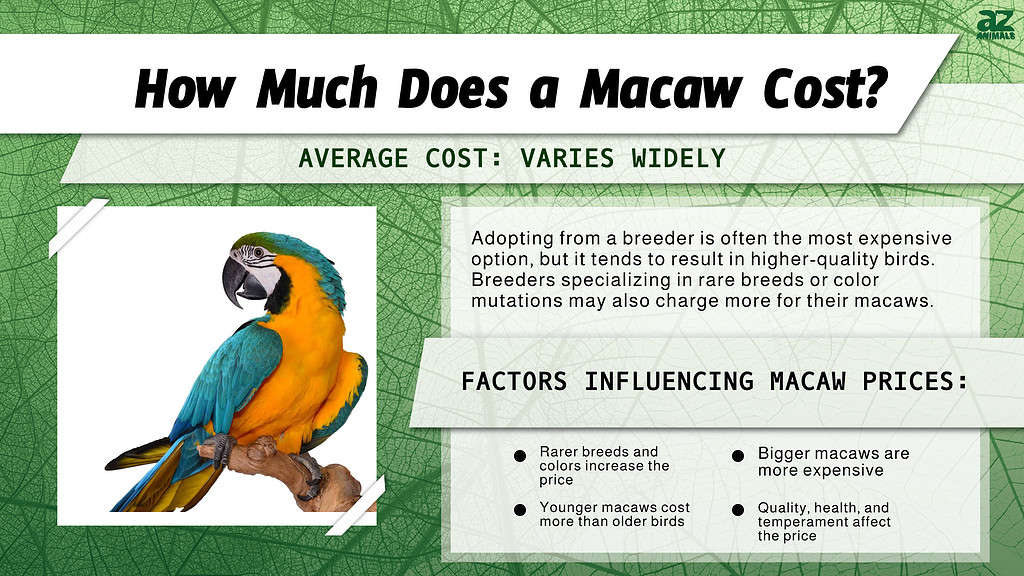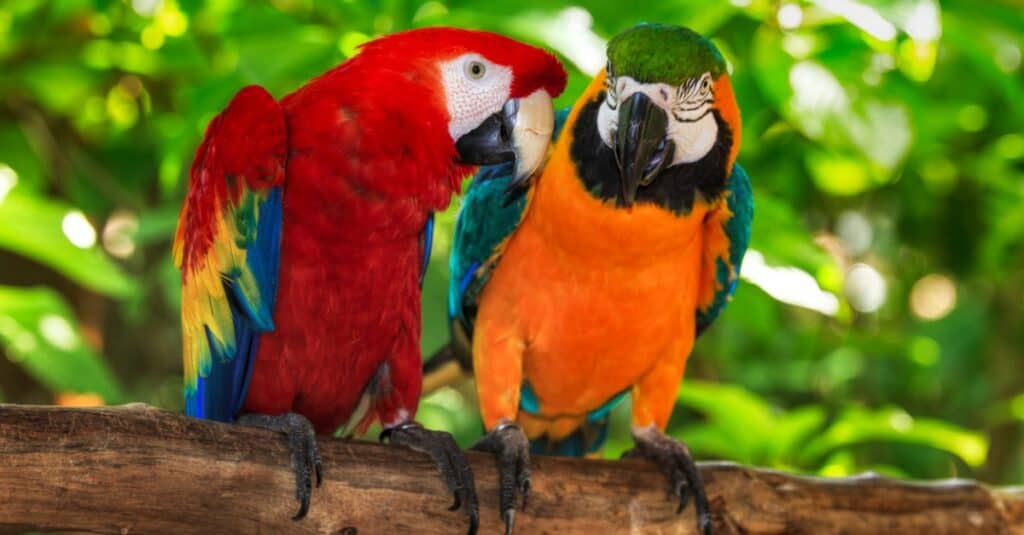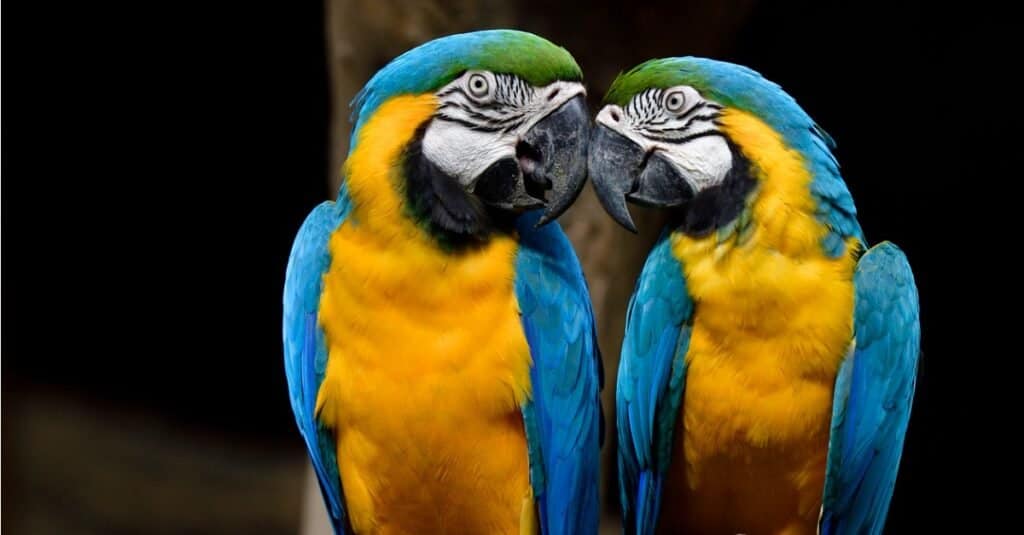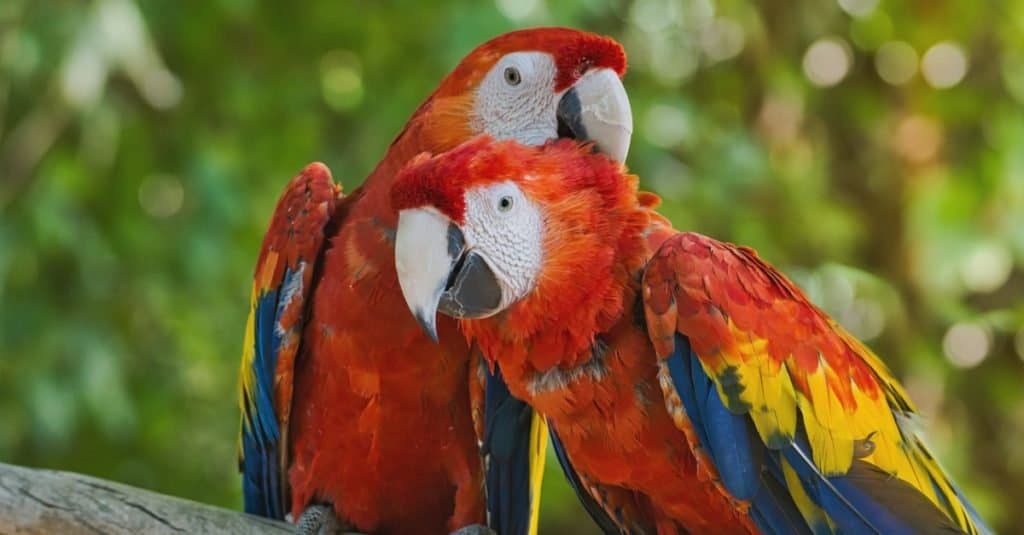Macaws can be fun, interesting companion birds. However, they are also one of the larger birds available, which tends to make them one of the more expensive options, too. Most macaws will cost at least $1000, which doesn’t consider all of the necessary supplies, either.
Some macaws are even more expensive than that. It isn’t odd to see these birds sold for several thousands of dollars, depending on the type of macaw.
Budgeting for these birds carefully is important, as they can cost a lot of money to take care of. To help you on this mission, we’ve listed everything you need to know about a macaw’s price below.

How Much Does a Macaw Cost?
Macaws vary widely in price, depending on the bird’s particular characteristics. The exact breed of macaw matters a lot, as there are several different options out there. Rarer breeds tend to cost more.
Here’s a quick rundown of several different breeds and their cost:
- Blue and Gold Macaw: $700 to $2500
- Scarlet Macaw: $2000 to $3000
- Hybrid Macaw: $1000 to $5000
- Smaller Macaw: $700 to $100
The exact color matters, too. Macaws come in various vibrant colors, and most are pretty colorful. However, certain color mutations or combinations may be more prized by collectors and enthusiasts. These rarer colors tend to make the bird cost more.
Bigger macaws tend to cost more, too. This increased cost is for two different reasons. Firstly, bigger macaws are more challenging and expensive to grow and take care of. Secondly, bigger macaws are more popular and sought-after, so people are willing to pay more for them.

Macaws come in many different shades and colors.
©iStock.com/dmodlin01
Younger macaws are often more expensive than older birds. Many people looking to adopt a bird want a younger bird, and this added demand makes them more expensive.
The overall quality can matter, too. The bird’s health, temperament, and socialization can impact the price, especially if the bird is a particularly good specimen. Of course, macaws that cannot be handled or with health problems tend to cost far less than other birds.
Where you’re at (and if you’re willing to travel) also matters. If macaws are rarer in your area, they may be more expensive. Additionally, factors like shipping costs and legal restrictions on the trade of certain species can affect prices in different locations.
Adopting from a breeder is often the most expensive option, but it tends to result in higher-quality birds. In other words, you’re getting what you pay for. Well-established and reputable breeders who prioritize the health and welfare of their birds may charge higher prices due to the quality assurance they offer. Breeders specializing in rare breeds or color mutations may also charge more for their macaws.
Finding a Quality Breeder (Or Adoption Center)
Finding a good breeder is essential, though, if you want to get a high-quality bird. Choosing what matters carefully can help you select the best bird for your situation without paying more than you have to.
Start by researching different breeders and adoption centers in your area or those willing to ship birds to you. Look for reviews, testimonials, and recommendations from other macaw owners or avian enthusiasts. Online forums, bird clubs, and social media groups can be valuable resources for gathering information and insights.
You can’t always trust these reviews. However, if everyone claims someone is a poor breeder, they’re probably right.
If you can visit the breeder or adoption center in person, do so. It’s important to assess the conditions and environment the birds are kept in when possible. Ask to see where the birds live (all the birds) and interact with the birds if possible. Ensure everything is clean and well-maintained.
Plan to ask any questions you might have. It’s important for breeders to be open about your questions and answer them truthfully. If the breeder continuously refuses to answer questions, it may be a red flag.
Ask about health screenings and guarantees. The last thing you want is to pay $4000 for a sick bird. The records should show that the bird has seen a vet and has regular vaccinations, if applicable.
The best breeders will support you in caring for your new bird. Many have programs and information available to help you take care of your bird. If a breeder doesn’t (or doesn’t seem to care who adopts a bird), you may want to look elsewhere.
Macaw Supply Prices

Macaws need
a lotof gear to thrive, and this can get expensive.
©iStock.com/PrinPrince
Macaws are big birds that need a lot of room and equipment to properly care for. You should plan on spending thousands on caring for your bird over its lifetime, especially because macaws can live for so long.
Knowing what to purchase and how much it may cost can be challenging for first-time (or experienced) bird owners. To assist you, we’ve created this short list of items:
- Macaw-sized cage: A macaw-sized cage is required to keep your bird in, and these can range between $300 to $1,000 or more. Bigger is typically better.
- Perches: Perches vary heavily in thickness and texture. You should purchase a variety for your bird to maintain their foot health. Usually, prices will be around $30 per perch, and you will need several.
- Food and water bowls: You’ll need a way to feed your bird, and most owners use stainless steel bowls. Luckily, these may cost as little as $30 or even come with the cage.
- Macaw-appropriate food: Your bird needs something to eat, too. This cost will be ongoing, as you’ll need to restock regularly. A month’s food supply can cost anywhere from $30 to $100, depending on the quality and brand.
- Treats: You’ll probably want to provide your bird with some treats for training and enrichment. Often, a bag of treats costs between $5 to $20. You’ll probably go through about a bag a month.
- Toys and enrichment items: Macaws are intelligent, curious birds that require significant mental stimulation. Some of this can be achieved through a variety of toys. Often, toys range from $10 to $50 each. You’ll need dozens and must replace them regularly, as macaws can also be pretty destructive.
- Cage liners or substrate: To make cleaning easier, macaw owners typically use some sort of liner for the cage. A pack of liners costs around $10 and can last at least a month.
- Cleaning supplies: Regular cage cleaning is important for maintaining a clean and healthy environment. Cleaning supplies like bird-safe disinfectants, brushes, and wipes are necessary. Prices for cleaning supplies can range from $5 to $20, depending on the brand and quantity.
- Travel carrier: You should also consider a travel carrier to transport your bird. You’ll need this for vet visits, at the very least. The price can range from $50 to $200.
Saving Money
Owning a macaw can be expensive. However, there are many ways you can save monthly on supplies. When possible, purchase items in bulk. Practically everything is cheaper in bulk. You can often find food in bulk, but consider purchasing bigger packages of liners, cleaning supplies, and toys, too.
Macaws go through a lot of toys, which can get expensive. Make your own toys and enrichment items using safe and bird-friendly materials. There are plenty of DIY tutorials and ideas available online. Repurposing household items like cardboard boxes, paper towel rolls, and natural materials can provide your macaw with engaging toys at a lower cost.
Often, you can repurpose and recycle items you already have around your house. For instance, you can use fabric scraps or an old t-shirt to make rope toys.
Keep an eye out for discounted and clearance items. If you’re planning on getting a bird, start shopping now. This way, you can take advantage of sales as they pop up.
Consider second-hand supplies if possible. Used cages, toys, and other items can often be found at lower prices, helping you save money while still providing for your macaw’s needs.
Macaw Food Prices
Food is a complicated topic, so it deserves its own category. The cost of food depends a lot on what you feed the macaw and how you get it. Commercial foods cost more than meals you throw together yourself, for instance.
The best food source for macaws is pellets. These should be designed specifically for macaws and made to be nutritionally complete. Preferably, pellets should comprise about 75% to 80% of the macaw’s diet. They provide everything your macaw needs.
Everything else should be considered “extra.” Seeds and nuts are natural energy sources often sold as bird food. However, they are high in calories and usually low in the nutrients macaws need. Over time, they can lead to nutritional deficiencies if fed exclusively. They should only make up 10% of your bird’s diet max.
Fruits and veggies can also be provided, as they are high in antioxidants and various vitamins. You can aim for about 15% of your macaw’s diet to be fruits and veggies. You can use these are rewards, especially if your bird particularly likes them.
Pellets may cost more than your average seed mix, but they are far healthier for your bird. In this situation, purchasing a more expensive option makes the most sense. Budget for quality food.
More Macaw Prices!

Your macaw’s vet costs can be significant.
©Amy Newton-McConnel/Shutterstock.com
There are a few other costs that your bird may incur over time. While these won’t occur as often, they’re still important to budget for.
For instance, every bird will need vet care eventually. You should plan on getting your bird regular checkups and nail trimming, as necessary. However, you should also have a small emergency fund for illnesses and injuries. You never know when these will occur, so it’s best to always be prepared.
The annual cost of veterinary care for a macaw will likely be around $200 to $800.
Macaws are very destructive and may cause damage to your home, too. You may need to purchase new furniture or repair furniture that you already have. Of course, you don’t know if or when your bird will do this. Once again, having a small emergency fund can be helpful in these situations.
These birds will also slowly wear down their own equipment. Toys must be replaced regularly, especially those made to be broken. You may need to purchase a new cage after several years, though some cages are designed to stand the test of time. Your bird will probably need new perches and swings, too.
All of these costs may seem like they’re far out in the future. But they can sneak up on you pretty easily.
Of course, you’ll probably want to purchase plenty of “extras” for your bird, too. You probably don’t need that Harry Potter-branded chew toy, but you may end up buying it anyway. These extra splurges can add up, even if they are small. You may want to budget a little extra so you can afford to purchase something you want to buy from time to time.
The photo featured at the top of this post is © Danny Ye/Shutterstock.com
Thank you for reading! Have some feedback for us? Contact the AZ Animals editorial team.






